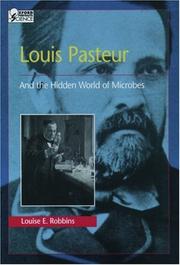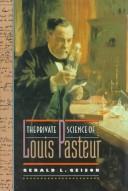| Listing 1 - 3 of 3 |
Sort by
|

ISBN: 1280603070 9786610603077 0198028547 1423742001 9780198028543 0195122275 0190284048 Year: 2001 Publisher: New York : Oxford University Press,
Abstract | Keywords | Export | Availability | Bookmark
 Loading...
Loading...Choose an application
- Reference Manager
- EndNote
- RefWorks (Direct export to RefWorks)
Chronicling Louis Pasteur's rise from humble beginnings to international fame, Louis Pasteur and the Hidden World of Microbes investigates the complex life of a man who revolutionized our understanding of disease. Alongside Pasteur's pioneering work with microorganisms, his innovative use of heat to kill harmful organisms in food--a process now known as "pasteurization"--and his development of the rabies vaccine, Louise Robbins places Pasteur in the context of his risky scientific methods and his rigid family and political beliefs. Robbins's reveals a man of genius with sometimes troubling convictions. Louis Pasteur and the Hidden World of Microbes is a fascinating look at one of the most important scientific minds of the last two centuries.
Scientists --- Microbiologists --- Microbiologists. --- Scientists. --- Professional employees --- Biologists --- Pasteur, Louis, --- Paster, Lui, --- Pa-xtʼ, Lu-i, --- Pasteur, --- פסטר, לואי --- Pasteur, L. --- Pasteur, Luis,

ISBN: 0691034427 1306984459 0691604975 0691633975 069101552X 1400864089 9781400864089 9780691034423 9780691604978 Year: 2014 Publisher: Princeton, NJ
Abstract | Keywords | Export | Availability | Bookmark
 Loading...
Loading...Choose an application
- Reference Manager
- EndNote
- RefWorks (Direct export to RefWorks)
In The Private Science of Louis Pasteur, Gerald Geison has written a controversial biography that finally penetrates the secrecy that has surrounded much of this legendary scientist's laboratory work. Geison uses Pasteur's laboratory notebooks, made available only recently, and his published papers to present a rich and full account of some of the most famous episodes in the history of science and their darker sides--for example, Pasteur's rush to develop the rabies vaccine and the human risks his haste entailed. The discrepancies between the public record and the "private science" of Louis Pasteur tell us as much about the man as they do about the highly competitive and political world he learned to master. Although experimental ingenuity served Pasteur well, he also owed much of his success to the polemical virtuosity and political savvy that won him unprecedented financial support from the French state during the late nineteenth century. But a close look at his greatest achievements raises ethical issues. In the case of Pasteur's widely publicized anthrax vaccine, Geison reveals its initial defects and how Pasteur, in order to avoid embarrassment, secretly incorporated a rival colleague's findings to make his version of the vaccine work. Pasteur's premature decision to apply his rabies treatment to his first animal-bite victims raises even deeper questions and must be understood not only in terms of the ethics of human experimentation and scientific method, but also in light of Pasteur's shift from a biological theory of immunity to a chemical theory--similar to ones he had often disparaged when advanced by his competitors. Through his vivid reconstruction of the professional rivalries as well as the national adulation that surrounded Pasteur, Geison places him in his wider cultural context. In giving Pasteur the close scrutiny his fame and achievements deserve, Geison's book offers compelling reading for anyone interested in the social and ethical dimensions of science. Originally published in 1995.The Princeton Legacy Library uses the latest print-on-demand technology to again make available previously out-of-print books from the distinguished backlist of Princeton University Press. These editions preserve the original texts of these important books while presenting them in durable paperback and hardcover editions. The goal of the Princeton Legacy Library is to vastly increase access to the rich scholarly heritage found in the thousands of books published by Princeton University Press since its founding in 1905.
Rhabdoviridae Infections --- Primary Prevention --- Biography as Topic --- -Disease Attributes --- Animal Experimentation --- Retrospective Moral Judgment --- Immunization --- Therapeutic Human Experimentation --- Animal Welfare --- Famous Persons --- Terminally Ill --- Research Personnel --- Iatrogenic Disease --- Research Subjects --- Rabies --- Pasteur, Louis, --- Paster, Lui, --- Pa-xtʼ, Lu-i, --- Pasteur, --- פסטר, לואי --- Pasteur, L. --- Pasteur, Luis, --- Scientists --- Biography. --- Biographies. --- Medical atlases, portraits, iconography. --- Medical research incl. research institutes, foundations. --- Scientifiques --- Biography --- Biographies --- France --- Pasteur, Louis, - 1822-1895. --- Scientists - France - Biography. --- Pasteur, louis (1822-1895) --- Chercheurs scientifiques --- Biographie
Book
ISBN: 1281603651 9786613784346 9814397342 9789814397346 9781281603654 9789814397339 9814397334 Year: 2012 Publisher: Hackensack, N.J. World Scientific
Abstract | Keywords | Export | Availability | Bookmark
 Loading...
Loading...Choose an application
- Reference Manager
- EndNote
- RefWorks (Direct export to RefWorks)
This book aims to describe, for readers uneducated in science, the development of humanity's desire to know and understand the world around us through the various stages of its development to the present, when science is almost universally recognized - at least in the Western world - as the most reliable way of knowing. The book describes the history of the large-scale exploration of the surface of the earth by sea, beginning with the Vikings and the Chinese, and of the unknown interiors of the American and African continents by foot and horseback. After the invention of the telescope, visual
Scientists --- Darwin, Charles, --- Mendel, Gregor, --- Pasteur, Louis, --- Faraday, Michael, --- Planck, Max, --- Fermi, Enrico, --- Fermi, Enriko, --- Faraday, M. --- Faradeĭ, Mikhail, --- Faradeĭ, Maĭkŭl, --- Fa-la-ti, --- פאראדײ, מ. --- Faradeĭ, Maĭkl, --- Фарадей, Майкл, --- Paster, Lui, --- Pa-xtʼ, Lu-i, --- Pasteur, --- פסטר, לואי --- Pasteur, L. --- Pasteur, Luis, --- Mendel, Johann Gregor, --- Mendel, Gregor Johann, --- Mendel, Rehor Jan, --- Mendel, J. G. --- Meng-te-erh, --- Darwin, Charles, Robert --- 5/6 <09> --- Geschiedenis van de exacte en toegepaste wetenschappen --- Mendel, G. --- Mendel, Gregorius Joannes, --- Mendel, Řehoř Jan,
| Listing 1 - 3 of 3 |
Sort by
|

 Search
Search Feedback
Feedback About UniCat
About UniCat  Help
Help News
News